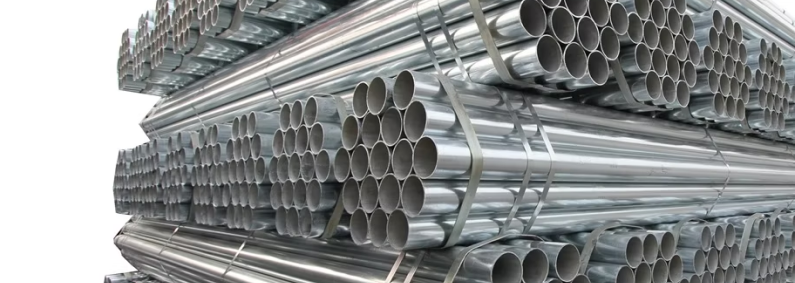
EN (European Norm) standards for steel pipes and tubes are developed by the European Committee for Standardization (CEN) to ensure quality, safety, and consistency in piping systems across industries. These standards cover a wide range of materials, including carbon steel, alloy steel, stainless steel, and plastic pipes, ensuring their suitability for various applications such as pressure systems, structural uses, and fluid transportation. Riyaarth Overseas offers premium-quality pipes and tubes that comply with EN standards, catering to diverse industrial requirements.
Key Features of EN Standards for Steel Pipes
Comprehensive Coverage:
- EN standards specify requirements for dimensions, tolerances, chemical composition, mechanical properties, and testing methods.
- Cover a variety of materials, including carbon steel, alloy steel, stainless steel, duplex steel, and plastic pipes.
Harmonized Regulations:
- Ensure uniformity across European Union member states by replacing conflicting national standards.
- Facilitate seamless trade and compliance with EU directives like the Pressure Equipment Directive (PED).
Versatile Applications:
- Applicable to pipelines for water supply, gas transportation, structural systems, heat exchangers, and high-pressure environments.
- Ensure reliability in critical sectors such as oil and gas, construction, power generation, and chemical processing.
Common EN Standards for Steel Pipes
Standard | Description |
EN 10216-1 | Seamless non-alloy steel tubes for pressure purposes at room temperature. |
EN 10216-2 | Seamless non-alloy and alloy steel tubes for elevated temperature purposes. |
EN 10217-1 | Welded non-alloy steel tubes for pressure purposes at room temperature. |
EN 10217-2 | Welded non-alloy and alloy steel tubes for elevated temperature purposes. |
EN 10216-5 | Seamless stainless steel tubes for pressure purposes. |
EN 10217-7 | Welded stainless steel tubes for pressure purposes. |
Manufacturing Process
Pipes manufactured under EN standards undergo rigorous processes to ensure compliance:
- Material Selection: High-quality raw materials are chosen based on specific EN requirements.
- Fabrication Techniques: Pipes are produced using seamless extrusion or welding methods to ensure structural integrity.
- Heat Treatment: Enhances mechanical properties like strength and ductility.
- Dimensional Inspection: Ensures compliance with specified tolerances.
- Mechanical Testing: Includes tensile strength, yield strength, and elongation tests.
- Non-Destructive Testing (NDT): Detects imperfections using ultrasonic or radiographic methods.
- Hydrostatic Testing: Verifies the pipe’s ability to withstand specified pressures.
Common Applications
Oil & Gas Industry:
- Used in pipelines transporting crude oil, natural gas, and refined products under high pressure. These systems ensure environmental safety by preventing leaks.
- EN standards also facilitate the design of pipelines that can handle extreme weather conditions and corrosive substances effectively.
Water Supply & Sewage Systems:
- Ideal for potable water pipelines due to their corrosion resistance and durability in harsh environments.
- EN-compliant pipes are also used in sewage systems where they handle high-pressure wastewater flow efficiently.
Construction & Structural Systems:
- Widely used in structural frameworks such as bridges and buildings due to their high load-bearing capacity.
- Additionally, EN standards guide the use of hollow sections in earthquake-resistant designs to enhance safety.
Power Generation:
- Essential for steam pipelines and heat exchangers in thermal power plants where high-temperature durability is critical.
- EN-compliant pipes are also used in nuclear reactors to handle radioactive fluids safely.
Chemical Processing:
- Utilized in chemical plants for handling corrosive substances due to their resistance to chemical reactions.
- EN standards help design piping systems that withstand aggressive chemical environments while maintaining plant safety.
Available Sizes and Dimensions
EN-compliant pipes are available in a wide range of sizes:
Pipe Size (NPS) | Wall Thickness (Sch STD) | Wall Thickness (Sch XS) |
1/2″ | 0.083″ | 0.109″ |
1″ | 0.109″ | 0.147″ |
Custom Sizes | Available on request | Available on request |
Testing and Quality Standards
To ensure reliability in critical applications:
- Hydrostatic Testing: Verifies pressure-handling capabilities.
- Non-Destructive Testing (NDT): Includes ultrasonic or radiographic inspections.
- Chemical Analysis: Confirms material composition compliance.
- Mechanical Testing: Evaluates tensile strength, hardness, and impact resistance.
Surface Finish and Coatings
To enhance durability:
- Standard finishes include black paint or varnish coatings.
- Optional coatings like epoxy or anti-corrosion layers can be applied based on specific requirements.
Quality Assurance & Packaging
Riyaarth Overseas ensures strict adherence to EN standards:
- Certifications: Compliant with relevant EN specifications, such as the EN 10216 series and EN 10217 series.
- Packaging: Pipes are securely packed with protective materials to prevent damage during transit.
Looking for reliable pipes that meet EN standards? Contact Riyaarth Overseas today for high-quality piping solutions tailored to your industry needs! Fill out our inquiry form or call us now!
FAQ's
EN standards ensure consistency across Europe by specifying requirements for dimensions, tolerances, materials, testing methods, and performance criteria.
Industries such as oil and gas, construction, water treatment, power generation, and chemical processing rely on EN-compliant pipes for safe operations.
By harmonizing specifications across EU member states, EN standards simplify cross-border trade while ensuring product quality and compatibility with EU regulations.

Products
Industry We Serve
- Oil & Gas industries
- Chemical process industries
- Pump and valve in high pressure component
- Food industries
- Pulp and paper industry
- Aerospace industry
- Power plant
- Mechanical component
- Sugar industry
- Cement industry
